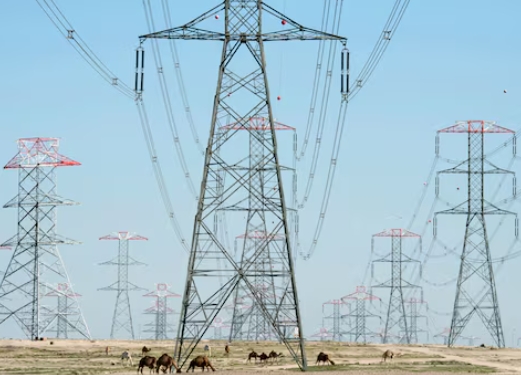Wedoany.com Report-Apr. 3, Kuwait, a major oil-producing nation, briefly reduced electricity supply to certain industrial and agricultural zones on Wednesday due to a spike in power demand triggered by hot weather. The surge exceeded the country’s generation capacity, which was limited by ongoing maintenance at power plants. The electricity ministry reported that the outages lasted less than two hours before power was restored, as noted in updates shared on X.
Camels graze around power grid towers in the Kuwaiti desert February 14, 2014.
The temperature in Kuwait climbed by approximately 10 degrees over the past week, reaching a high of about 38 degrees Celsius (100.4°F) on Wednesday. In summer, temperatures in this Gulf nation frequently surpass 50 degrees Celsius, intensifying electricity needs. This situation echoes last summer, when Kuwait implemented scheduled power cuts for the first time in years, driven by growing demand, urban growth, and delays in plant upkeep.
To manage the strain, the electricity ministry urged residents to lower their power consumption, particularly between 11:00 a.m. and 5:00 p.m. (0800 to 1400 GMT). The ministry stated: “Reducing usage during peak hours helps balance the load on our system.” Last summer, Kuwait tapped into the Gulf Cooperation Council Interconnection Authority’s grid, which links Gulf countries, to import electricity and ease shortages.
Kuwait has also taken steps to secure additional energy resources. In August, Kuwait Petroleum Corporation finalized an agreement with QatarEnergy to import 3 million tons of liquefied natural gas annually, supporting the rising need for power generation. Additionally, the country signed a framework deal with a Chinese partner last month to develop renewable energy projects, aiming to generate around 3,500 megawatts. These efforts reflect Kuwait’s strategy to address both immediate and future energy demands.
The temporary cuts highlight the challenges Kuwait faces in maintaining a stable power supply amid extreme weather and infrastructure constraints. As an OPEC member reliant on oil exports, the country is working to diversify its energy options while meeting domestic consumption needs. The restoration of electricity within hours and the call for conservation show a practical response to the current situation, while long-term plans with regional and international partners aim to strengthen capacity.

















